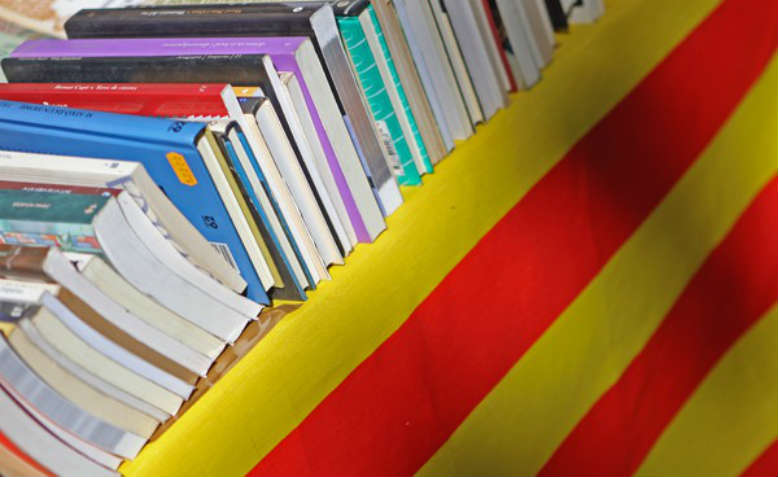 Photo: Wikimedia Commons
Photo: Wikimedia Commons
As the Catalan crisis grows, Chris Bambery provides a comprehensive reading list to understand more about it’s history
Catalonia has burst into the news, and for many of us into our lives. It’s time to discover more about this nation and the rising tide of support for Catalan independence. So, to help here is my suggestions for what to read:
Michael Eaude’s Catalonia: A Cultural History (Signal Books) is an excellent starting point giving a racy run through Catalan history as well as its rich culture. It offers readable sections on Catalonia’s transition from the Franco dictatorship to autonomy, the opposition to the dictatorship, not least that played by the Nova Cançó musicians in the 1960s who performed in Catalan, defying the ban on it being used in public.
Andrew Dowling’s Catalonia Since the Spanish Civil War: Reconstructing the Nation (Sussex Academic Press) provides an accessible history of post-1939 Catalonia. What it is good at is explaining why the decision of the 2010 Spanish Constitutional Court to rip up key points in Catalonia’s new statute of autonomy, passed in a referendum three years before, was the key point in shifting support for independence from very much a minority view to one that was such a force in Catalan politics.
Covering similar ground is Kathryn Crameri’s ‘Goodbye, Spain?’: The Question of Independence for Catalonia (Sussex Academic Press) the strength of which is showing how that shift was also fueled by the impact of the grim recession which followed the 2008 financial crash, and by the rise of Spanish nationalism associated with the Popular Party, now in government in Madrid. It’s also good at demonstrating how Catalan nationalism has shifted from emphasizing the need to safeguard the language and culture to one also championing the economic benefits of independence for the Catalan people. She has also written well on the Catalan language and how it survived Franco’s attempts to destroy it and been able to reach out to different waves of migrants, Catalonia: National Identity and Cultural Policy, 1980-2003 (Gwasg Prifysgol Cymru/University of Wales Press).
Liz Castro is an important English language champion of Catalonia. The volume she edited, What’s up with Catalonia?: The causes which impel them to the separation (Catalonia Press) does a great job in bringing together Catalan politicians, academics and grassroots activists to explain why they back independence.
On Barcelona Michael Eaude’s Barcelona: The City That Re-invented Itself (Five Leaves) remains a personal favourite offering not just an easy to read history of the city but also a series of walks, ideal for the revolutionary tourist! He will forgive me, however, if I give pride of place to Barcelonas (Verso) by the Catalan writer Manuel Vazquez Montalban, who wrote this for the 1992 Olympics. Montalbin writes affectionately of his home city, but is not sentimental in his history of it and is scathing of what happened to it in the build-up to the Olympics, and what has been continuing since he wrote this. Barcelona, he argues, ‘has become a market, and everything is up for sale’. You’ll need to find it second hand.
If you like Robert Hughes then try his Barcelona (Vintage) which is an excellent history of the city and Catalonia but ends with the death of the architect Antoni Gaudi in 1926.
A book I’ve enjoyed and learnt much from is Chris Ealham’s Anarchism in the City: Revolution and Counter-Revolution in Barcelona, 1898-1937(AK Press). Barcelona in that period was home to the most insurgent working class outside Russia, the competition for that title was strong. The anarcho-syndicalist union federation wrote a brilliant page in working-class history and this book is a warts and all history, but is full of examples which can translate into today’s world.
Covering similar ground is Temma Kaplan, Red City, Blue Period: Social Movement’s in Picasso’s Barcelona (University of California Press) which obviously has a strong cultural element, something you can’t ignore when dealing with Barcelona.
Regarding the Civil War, aside from Orwell’s Homage to Catalonia, the best account of the war in Catalonia is Pelai Pagès i Blanch’s War and Revolution in Catalonia, 1936-1939 (Haymarket).One of the things that stood out about Barcelona in the Civil War were the wonderful posters produced by the political parties, unions and the Catalan government. One of the artists responsible was Carles Fonserè and his Memoirs of a Spanish Civil War Artist (Pensódromo) traces his evolution from a right-wing schoolboy to an exiled Republican.
In terms of fiction then Montalban cannot be missed. You’ll have to look in the second-hand market but his two is novels covering the transition to democracy in the 1970s, Murder in the Central Committee and The Angst-Ridden Executive (both Pluto Press or Serpents Tail) are worth the effort, although the way women are portrayed speaks of the time it was written in.
In recent weeks I’ve enjoyed Black Bread (Biblioasis) by Emili Teixidor which is set in rural Catalonia in the immediate aftermath of Franco’s victory. Andreu’s father is in jail, his mother works long hours in a factory so he is living with his grandparents in the country, home to an extended family. It brings home in a subtle way a working-class world policed by the falange and the Guardia Civil.
Vampire novels aren’t my usual cup of tea but I made and exception for Barcelona Shadows (Pushkin Press), by Marc Pastor, set in Barcelona in 1911, and in the same vein I liked Sebastia Alzamora’s Blood Crime (Soho Press) which puts a vampire on the lose amidst the revolutionary Barcelona of 1936.
On the Civil War, it’s taken me a while to discover Soldiers of Salamis (Bloomsbury) by Javier Cercas, which I thoroughly enjoyed.
They’re my suggestions. There are plenty more books to be found, and many more in the pipeline. Including George Kerevan and my forthcoming Catalonia Reborn.

